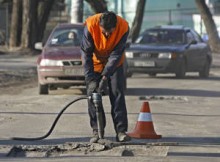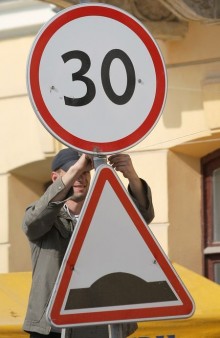Next year a new reform for roads maintenance will be implemented. Ukravtodor will hand over 117,000 kilometers of roads of local importance to regional administrations. The State Road Agency will keep only 52,000 kilometers of national roads under its submission. Experts working for the agency hope that such changes will give local authorities the opportunity to decide on the optimal allocation of resources for repairs taking into account the needs of each region.
“This is the principle followed in road management in most of European countries and even our northern neighbors – Belarus and Russia,” said the Head of Ukravtodor Yevhen Prusenko. “It is not right, when decisions on repair of a section of a road between villages in any region are adopted in Kyiv. The resources are also allocated in Kyiv.”
It has been promised that along with the responsibility for roads maintenance the local authorities will receive the budget money for the repair and even the maintenance crews. The plan states that next year they will repair 7,700 kilometers of roads of local importance. According to preliminary calculations, the repair works will cost more than 10 billion hryvnias.
The head of Ukravtodor says that over 2,000 kilometers of roads are not subject to patch repair. “These are the roads, where patch repair will not help. The coating on these roads needs to be completely redone. Additional resources are searched for to do this as soon as possible. But it is clear already that the work won’t be done completely the way in should be done. The situation will have to change radically next year,” admitted Prusenko.
Ukravtodor estimates the reconstruction of the country’s roads at 500 billion hryvnias, while last year only about seven billion hryvnias was spent for such purposes.
COMMENTARIES
Yevhen CHERVONENKO, former Minister of Transport (2005), former head of Zaporizhia Oblast State Administration (2005-07):
“It is a positive idea, which will reduce the corruption component. When a governor looks at a situation on the spot, he knows better, which roads need what amount of money for their repair. Before, such decisions were made and approved by top officials in Kyiv: they determined where the money should be spent, what contractors to hire. Now the head of the local Road Agency is fully subject to the governor. It won’t be as easy to steal money now because people are closer and it is easier for them to ask of how things are done, since everyone will know that money for road repair will be at the disposal of local authorities. The main thing is to make it work in such way that money would be allocated according to the number of roads that are the responsibility of the local authorities. There is more than nine billion hryvnias on the account of Ukravtodor at the moment, but the Treasury does not give them the money. Besides, the actual state of our roads is so bad that it will take more than a year or two to solve the issue of their full repair. I am afraid that we will soon have a disaster with our roads. The percentage of patches and patch repair exceeded the norm.”
Volodymyr HROISMAN, Mayor of Vinnytsia:
“Such decentralization is positive. It is wrong when the power and funds are concentrated and managed from Kyiv, while the local authorities cannot influence any of the decisions. The only issue left to be solved is how the funds will be distributed according to the scope of the repair work. Oblast State Administrations and oblast budgets should be provided with resources for repair and maintenance of roads. Experience of the European countries shows that decentralization always reduces corruption and abuse. It has been also proved by the European experience that financial resources are used more efficiently up to 30 percent at the local level than if they were centralized. I think that if the powers and resources that could be used for road repair will be handed over to local administrations the situation will improve. I believe that in the future oblast administrations will delegate certain functions in repair and maintenance of roads to raion administrations and local communities. That would be even more efficient. The lower, the better.”
Petro SHKUTIAK, MP of Ivano-Frankivsk Oblast Council, member of the Council Committee on Budget, Taxation, and Investment:
“Now local governments will have more influence on road repair. But, I think there still are going to be some distortions. Some settlements will receive more money, others – less, depending on the preferences of a governor to a particular official.”
Petro ADAMYK, MP of Lviv City Council, member of the Commission on Public Property:
“Local authorities know better than anyone where the money is needed. Presently the central government collects a hryvnia as a tax from Lviv citizens and gives back only 22 kopecks. They also give back some part of that money in the form of subsidies. For example, they give money for building a stadium. And we say, ‘Thanks, but we don’t need a stadium. We need new pipes, roads, transportation.’ Now what concerns the decision on handing over road maintenance into submission of oblast administrations. At first they said that these functions would be directly delegated to local communities and they would decide on their own what their needs are. But instead, it will be governors, who will allocate the funds for road maintenance, and nothing will change systematically. Most likely, it will be a simple toggling of the responsibility for the state of the roads on governors without giving them the necessary authority.
“Today, the total amount of taxes that we pay in the form of excise tax on gasoline should have reached nearly 40 billion hryvnias. But somehow only seven billion was actually collected. And even the already registered appropriations are not easily issued by the State Treasury. The payments are delayed for 3-4 weeks.
“Besides, the amount of funds allocated for road maintenance is negligible in comparison with the actual needs. According to the estimates of Ukravtodor, more than 500 billion hryvnias is needed for restoration of the road network in Ukraine, but next year the state government will provide the funding that is 50 times less than that.”
Petro DEMENTIEV, Head of Transport and Communications Department of the Industry and Infrastructure Office in Kherson Oblast State Administration:
“We believe that this initiative is relevant and necessary today. It is better seen on site what roads need immediate repair, therefore, there will be an opportunity to get money more quickly to get it done. It will be much easier to plan maintenance works on certain segments. It is especially important for the roads approaching individual settlements, where convenient connection needs to be restored. It is not yet determined exactly which unit of the Oblast State Administration will deal with this segment of work, but we are already getting ready to take the responsibility for the road maintenance by our agency. The transfer mechanism is developed in the Cabinet of Ministers and once everything is ready, we will proceed with the legal aspects and the actual work on local roads. Today there are many problems in this area, that’s why, this reform, in my opinion, will bring positive results. I hope that state funding will be received timely and local governments will also use money from local budget – both the budget of oblast administration and the budget of the specific city or village where the repair or construction works will be performed.”









